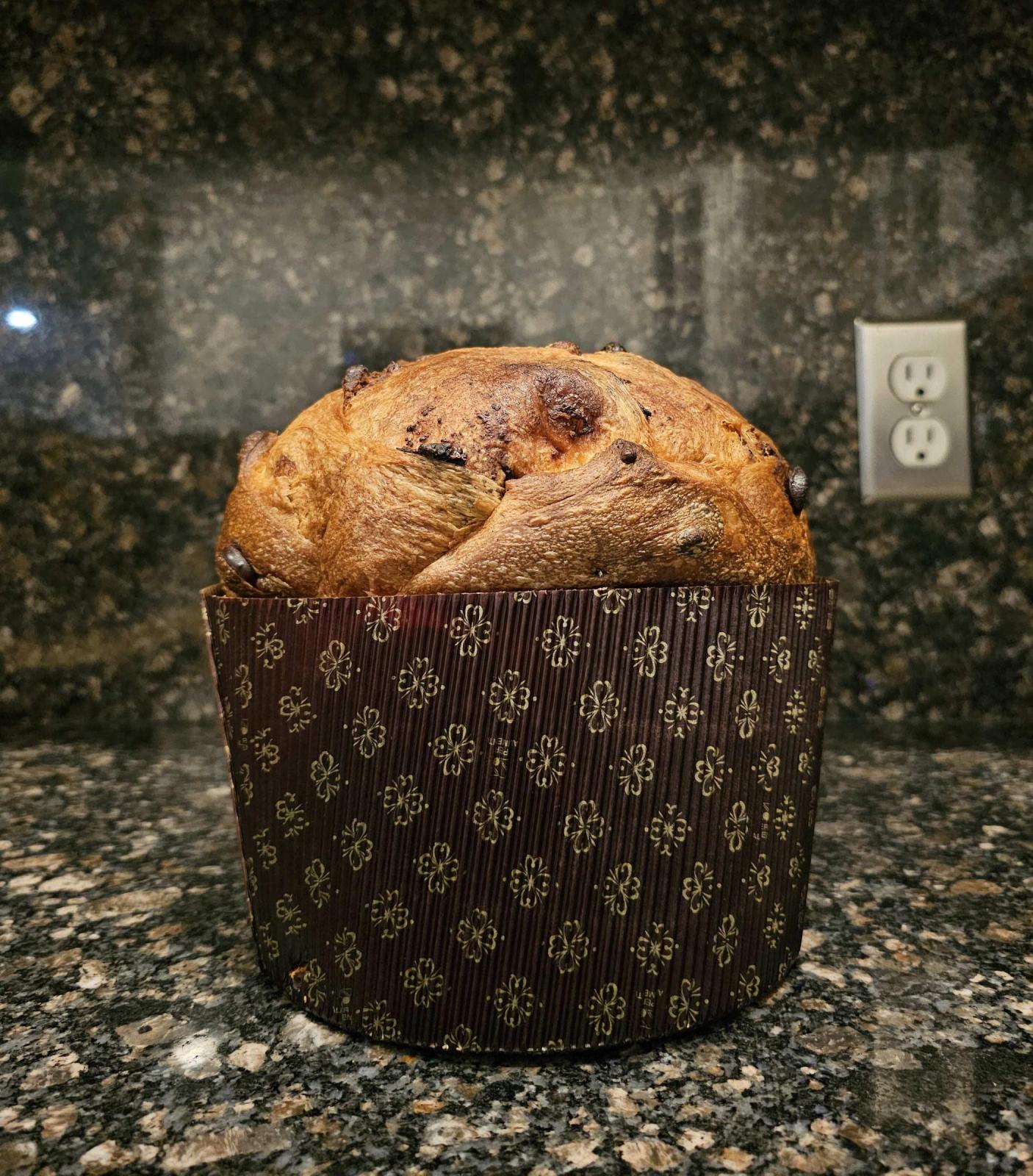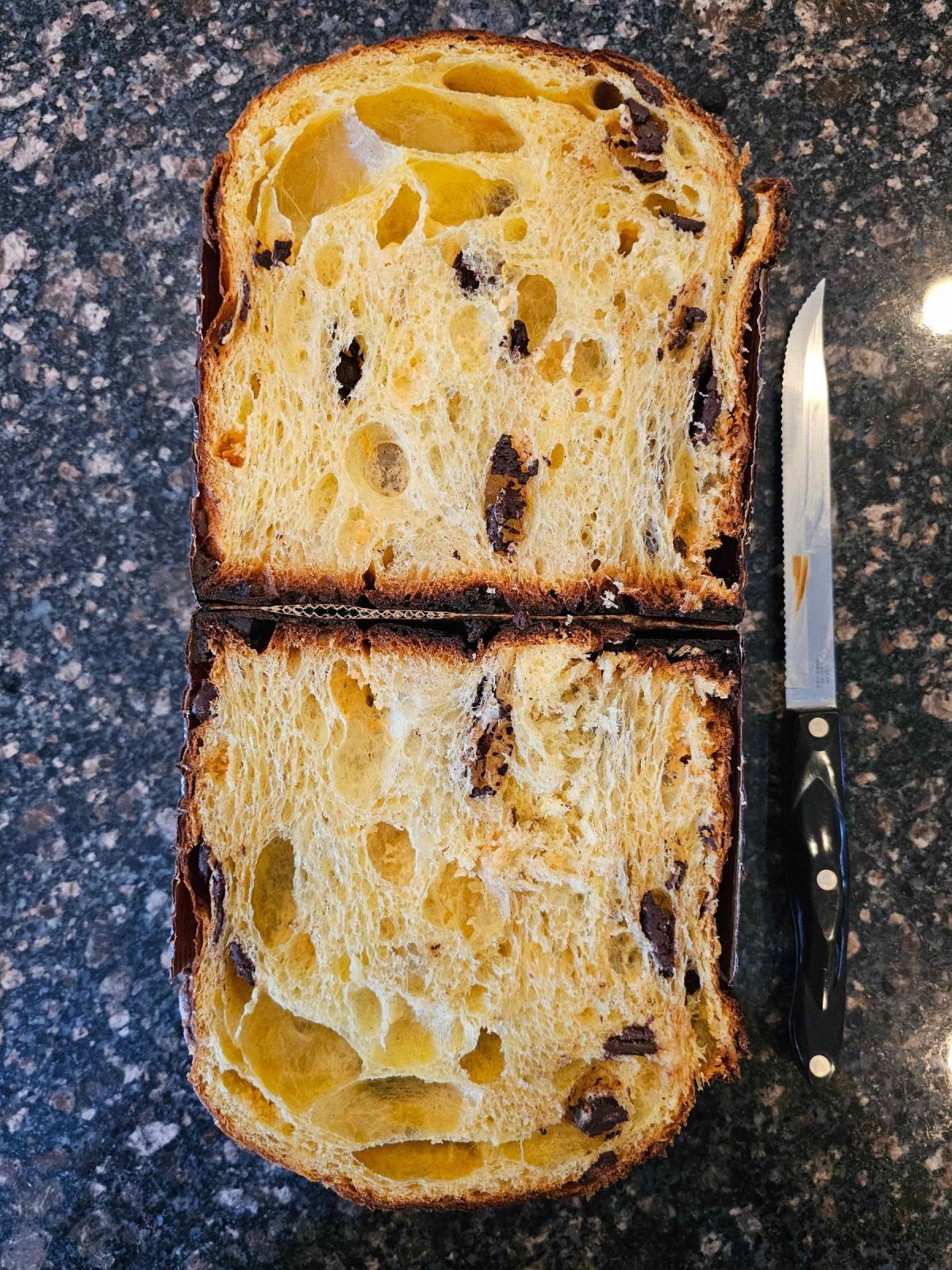

Almost exactly two years ago, I stopped lurking on this site and finally posted something - a plea for help. I had been making panettone with a liquid sourdough starter for a few years before switching to a lievito madre and I could not figure out why my dough was turning to soup when adding the butter. Looking back, the key thing I didn't realize was just how little I understood about the process.
Fast forward two years and another desperate post trying to make sense of all this and I've finally found some success in making panettone leavened with lievito madre. I've lost count of how many times I've failed over those two years - primi that didn't rise, secondi that turned to soup, flat tops, blowouts, panettoni falling out of the mold - the list goes on. I often failed spectacularly. So many ingredients in the trash and so much disappointment and frustration often met by friends and family with "Why bother? Can't you just buy one?".
I followed EIDB's panettone recipe from Sourdough Panettone and Viennoiserie. This is the recipe I started with a few years ago, thinking I should try the recipe by the person who wrote the book, not having realized that the book both literally and figuratively had already been written in one way or another by the maestri featured in SPV, among some others. At the time, I wasn't familiar with the maestri or their formulas, but even after discovering them, I wanted to continue using the same formula to eliminate variables when things went wrong, as they often did. At one point, when butter was my nemesis, I scrutinized all of the formulas in SPV to try and find one that didn't contain an outrageous amount of butter and found that EIDB's wasn't too bad in that regard, so I stuck with it.
In the past, I used whatever strong flours I had access to, which all happened to be malted. At some point, I decided that malted flours were a bad idea, at least until I had enough experience to deal with them. I could never get them to work, so when I created my new LM I used Caputo's Manitoba Oro, which I also used for the primo and secondo.
I did modify the formula a bit. Rather than orange paste, I used orange and lemon zest along with vanilla bean. I did not add the bassinage water because the recipe says something like "add the bassinage water if necessary" and I was never really sure what necessitated bassinage water. Given my history of failed secondi, I thought it best to leave it out. For inclusions, I used white and dark chocolate since candying orange peel was something I gave up when the end product seemed to constantly be in question.
I guess the most important part, my LM, was not maintained according to any specific formula or plan. For the most part, my LM is constantly in maintenance mode with a single refreshment before letting it rest for nearly 24 hours at 16 - 17C. A few times a week I will expose it to heat with either a warm refreshment or hot bagnetto. I typically keep the LM in water, but if I notice it getting sluggish or not rising well, I'll use free maintenance for a few days. If I know that I won't be able to refresh it for a day or two, I bind it and put it in the fridge. It's all a balancing act between my schedule and what the LM seems to need. I do tend to push it pretty hard towards acetic since the failures still leave me with a really good loaf of bread.
I played a little bit with refreshment ratios along the way as well. I noticed that refreshing 1:1 (starter:flour) and leaving at 16 - 17C for 20 - 24 hours would yield a pH right around 4.0, but refreshing 1:2 with all else kept the same would yield a pH of 3.8 - 3.9, but with a less dramatic rise. Seeing how higher flour ratios would drive pH lower, I also experimented with ratios during the warm refreshments. For this bake, I refreshed 1:1.25 at 28C (about 5.5 hrs) for the first followed by 1:1 at 28C (about 4hrs) for the second. I didn't perform a 3rd. Two refreshments in this way also wound up being a lot more convenient with my schedule. Regardless of the warm refreshments, I can't seem to hit 4.0 - 4.1. Once the starter has tripled, I've been using the LM at around pH 4.15 - 4.25, though I've been trying to get sub 4.1 to see if it helps at all with primo acidification.
I still had issues, of course, the main one being the seemingly infamous primo acidification. I think my primo was about pH 4.3 by the time it had tripled. It also tripled in only about 10 hours which is very fast considering I closed the primo at about 22C. The panettone also seemed to get a bit darker than I wanted. I set my oven according to a thermometer placed on the rack where the panettone would go, but I guess that means that maybe higher up in the oven, where the panettone would rise, was too hot. In the past, I glazed most of the panettoni I've baked and hadn't had this problem, but after many flat tops I decided not to glaze, thinking that the glaze was maybe hardening early and preventing some oven spring.
In any case, the panettone was delicious. So light and delicate that it was almost difficult to slice, yet strong enough to hold its shape and pass the "cotton candy test". Not quite where I want it to be, but a massive success for me nonetheless.
Edit: A picture of the crumb from the second loaf from the same batch, cut one week after baking. I didn't butcher this one as much when slicing it. This one was a bit darker on the outside and cooked to a higher internal temperature (unintentionally - used a different oven that I'm not as used to), so I thought this one would be in rough shape but I'm very happy with this crumb.
I really went for it - the bake right before this resulted in the panettone falling out of the mold when I hung it. So, a few days later I decided to change almost nothing and bake 2 instead of 1 😅. The previous bake was glazed - I wonder if I went too heavy on the glaze, weighing down the dome and causing it to fall. My LM was not significantly different between the two bakes - certainly not "fall from the mold" lactic.
